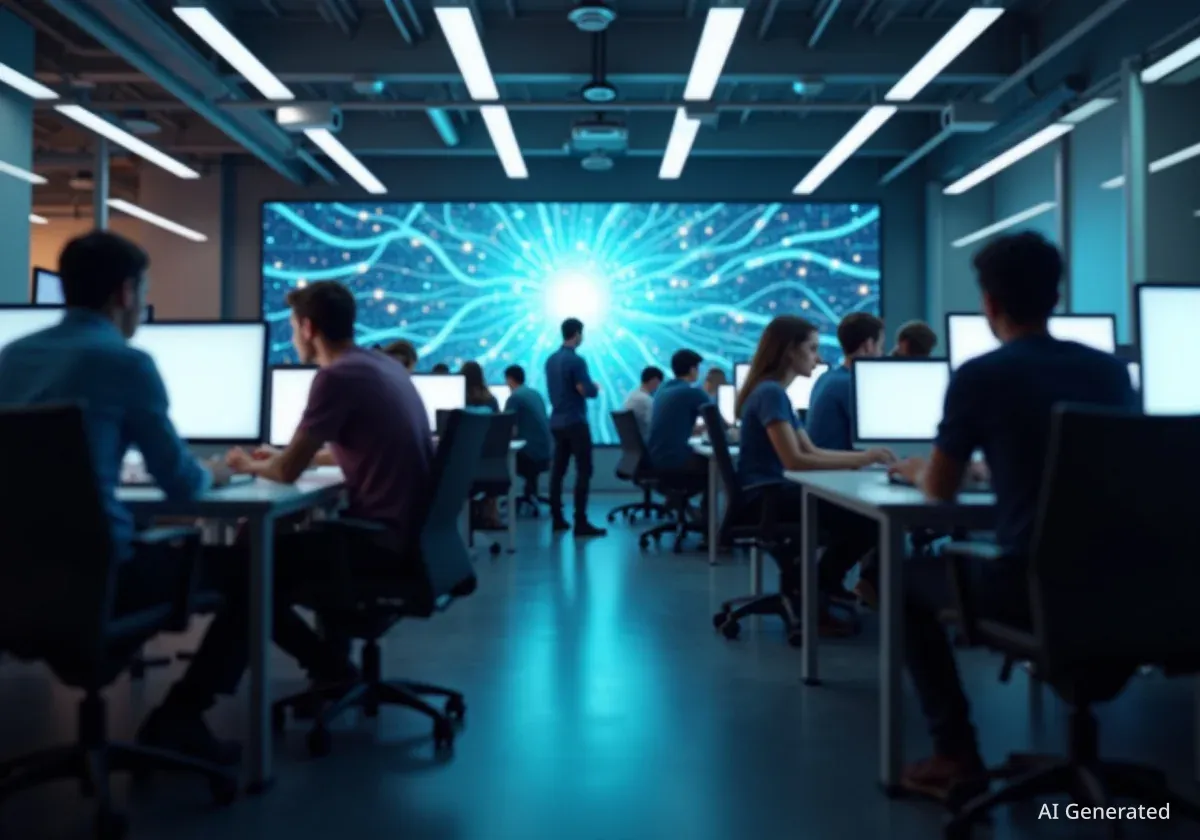A recent 24-hour hackathon in Singapore drew over 400 participants, from seasoned engineers to complete novices, all tasked with a single goal: build something innovative from scratch using artificial intelligence. The event, backed by global AI leaders like OpenAI, Google DeepMind, and Anthropic, signals a significant shift in the tech development landscape, where product vision and creativity are becoming as crucial as coding expertise.
Organizers aimed to reinvigorate the local tech community by focusing on hands-on creation, moving away from corporate panels to pure, unadulterated building. The result was a burst of creativity, with around 150 projects submitted in just one weekend, highlighting how accessible AI tools are transforming who can be a creator.
Key Takeaways
- A major 24-hour AI hackathon in Singapore attracted over 400 participants, with support from top tech firms like OpenAI and Google DeepMind.
- The event's goal was to revive Singapore's "builder community" by emphasizing hands-on creation over theoretical discussions.
- Approximately half of the attendees were first-time hackathon participants, demonstrating a lower barrier to entry thanks to AI tools.
- The winning project, an AI-powered whiteboarding tool, earned its creator prizes valued at over S$50,000.
- Experts and participants believe AI is democratizing tech development, allowing individuals with strong product ideas but limited coding skills to build functional prototypes quickly.
A Mission to Revive the 'Builder Soul'
The hackathon was conceived with a clear purpose: to bring back the authentic spirit of innovation to Singapore's tech scene. Organizers felt that recent technology events had become too commercialized, losing touch with the core community of creators and developers.
Agrim Singh, a co-founder of Niyam AI and one of the event’s organizers, encouraged participants to think outside the box. "Use your imagination... build something unhinged. Build something wacky," he urged the crowd at the start of the event.
This sentiment was echoed by fellow organizer Sherry Jiang, co-founder of the fintech app Peek. She noted a feeling among many in the industry that the local hackathon scene had faded from its prime. Singh elaborated on this in a public post, stating that "the Singapore hackathon scene lost its soul." He recalled a time when such events were centered on builders creating functional products, not on "panels or sponsorship decks or photo ops."
The Evolution of Hackathons
Historically, hackathons were intensive events where software developers, designers, and project managers collaborated to create new software projects in a short period. The focus was heavily on technical skill and coding proficiency. The rise of AI-assisted tools is now changing this dynamic, making these events more accessible to a broader range of creative and business-minded individuals.
The massive turnout, with over 400 people dedicating their weekend to the challenge, suggests a strong appetite for this back-to-basics approach. The energy was palpable, with teams spread across a university campus, fueled by a shared passion for building.
The Democratization of Development
A defining feature of the event was the diverse skill level of its participants. According to Jiang, about half of the attendees were completely new to hackathons. This shift is largely attributed to the advancement of AI, which has dramatically simplified the development process.
The concept of "vibe coding," where developers use AI to translate ideas into code, was central to the event's success. It allows individuals with a strong product vision but limited technical background to create functional prototypes.
"I feel like people who [have a good] product sense and good taste and know how to position their products are starting to do really well at these hackathons because engineering is a lot easier now," Jiang explained. "We’ve lowered the barrier, but raised the bar."
This new paradigm was evident in the competition's results. Jiang pointed out that some participants who had only learned to use AI coding tools a few weeks prior placed high in the rankings, outperforming some experienced engineers. The focus is shifting from how you build to what you build and why.
From Idea to Product in 24 Hours
The rapid development cycle enabled by AI was on full display. In just 24 hours, approximately 150 distinct projects were submitted for judging. This level of productivity would have been unimaginable just a few years ago, highlighting the efficiency gains from AI-assisted tools.
Participant Richard Lee, who built a gamified habits-training app, joined the hackathon to test these new limits. "I took it as a personal challenge to see what could actually be done within 24 hours... and to see how far vibe coding has advanced," he said. For Lee, the event was a gathering of "builders ... who don’t just learn, but do."
Innovation Under Pressure
The 24-hour timeframe created an atmosphere of intense focus and collaboration. As Sunday morning arrived, the signs of a sleepless night were everywhere. Organizers found participants sleeping on benches, on the floor, and in unused lecture rooms.
"We were trying to do a bit of a count... And we found people in like random lecture rooms. It was just the funniest thing... It was like catching wild Pokemon," Jiang recounted. An estimated 70 people stayed overnight to complete their projects.
Lee was among them, sleeping for only about 30 minutes on a lecture hall floor. Despite his prior experience with coding languages like Python and SQL, he felt the hackathon significantly enhanced his skills. He described the experience as a compressed version of launching a startup, forcing intense focus to achieve a tangible outcome.
The projects themselves showcased a wide range of creativity:
- F**Yu.AI: A productivity app that humorously "bullies you into greatness" by calling your phone to yell at you about unfinished tasks.
- RizzedIn: A dating platform designed to connect career-focused individuals.
- Orbie: A gamified app for building and tracking personal habits.
- Heirloom: A digital time capsule for preserving family stories and recipes, built by a team with diverse backgrounds in product, design, and engineering.
The Winners and the Future of Work
The grand prize, valued at over S$50,000, was awarded to Sritam Patnaik. He developed an AI-powered whiteboarding tool that allows users to draw simply by using hand gestures tracked through a webcam.
Other top projects included a human-versus-AI speed game and a tool described as a "Netflix for corporate training," designed to make mandatory compliance videos more engaging for employees. These winning ideas underscore the shift towards user experience and practical application.
Participants and organizers agree that AI's impact extends far beyond hackathons. Lee believes that both startup and corporate developer teams will likely become smaller and more agile. "The time to build is far shorter than before. I think it’s really much easier for developers or technical people, or even non-technical people to build a prototype," he stated.
However, technical knowledge remains valuable. Lee emphasized that understanding fundamental logic and how to evaluate and debug code is still critical. The challenge for engineers now is to continuously upskill with the latest AI tools to avoid becoming redundant. This Singapore hackathon was not just a competition; it was a glimpse into the future of tech creation—a future that is more inclusive, faster, and more imaginative than ever before.





